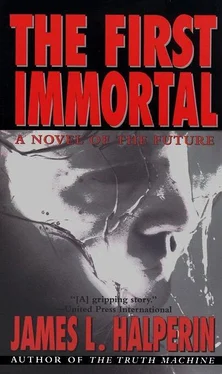Politics seemed as good a subject as any, even without the research advantage family connection afforded. And any opportunity to watch Dad in action was not to be given up, for it would certainly be my desire to follow in his path. My eyes rarely left him.
“Do you really believe,” my father, now Senate Minority Leader George Crane, lectured, “that the death penalty is appropriate punishment for failure to pay the premium on one’s biostasis insurance?”
Of course not, I thought. Way to go, Dad! Exactly!
Fortunately, Dad’s question was rhetorical; otherwise the overwhelmingly Republican assembly might have intoned a resounding “Aye.”
But this fourth-term Democratic senator (a rarity these days) was shrewd enough to brandish a more cogent justification: “Apart from simple decency, it will cost the government a lot less money to subsidize suspension for those who can’t afford it than to sustain the greatest class conflict since our turn-of-the-millennium War Against Crime.”
I’d been studying contemporary politics, and realized that my father’s admonition addressed the single obsession of the prevailing Republican majority: money. I well knew that cost efficiency had been the measure of every major legislative and executive decision since Swift and Sure author Travis Hall’s election as President in November of 2004. His landslide reelection in 2008 and former Vice President Garrison Roswell’s convincing victory in the presidential elections of 2012 had only reinforced their philosophy. The Swift and Sure Anticrime Bill itself exemplified “neorightism,” since the true impetus behind it had been money; President Hall hadn’t sold his bill as a moral absolute but rather as the only financially sustainable (and therefore politically tolerable) method of winning the War Against Crime.
Since then, codified pragmatism had become the banner of third millennium Republicans. Sacrifice the few for the many, don’t try to rescue everyone, or the overloaded ship-of-state might sink.
Faster and cheaper computers allowed instant access to all public scientific data, but approaches for filtering objective data from self-serving hyperbole were still evolving. The Republicans were wise enough to encourage the free market to do the sorting. Financial incentives had already been instituted to encourage businesses to set up open “electronic fact forums” in easy-to-follow hypertext, allowing scientific experts, both human and artificial, to rate each other’s theories for objectivity and clarity of thought. The market insisted on due process and confirmable double-blind analysis by tending to ignore those opinions that failed to use objective standards. Hyperbole was filtered out through the SPERs (statistical peer-review expert-credibility ratings), upon which opinion makers gained or lost most of their influence. As artificial intelligence machines became progressively smarter, Republican legislators and their staffs gradually developed the habit of giving the AIs access to as much data as possible, then letting them suggest where to deploy available funds to do the most good.
We leftists would assert: Some values can’t be gauged. For example, every law-abiding American citizen is too precious to denominate financially. We should never surrender even a single life we could reasonably expect to save.
The New Republicans’ answer: Life has always been a commodity, measured in terms of dollars. Long before the achievements of TraffiCop and satellite navigation, we were perfectly capable of making our cars safer and saving thousands of lives per year; but then fewer of us could afford to drive. We could have lowered the speed limit and saved even more lives, but in America, time is money, and money is the coin of life. So we opted for a dispassionate trade-off: money and time saved with the loss of random human lives as a secondary consequence. And in so doing, we improved the average prosperity, and average quality and quantity of life for all of us.
This example illustrated the common principle of the New Republican Dynasty: the cold-blooded calculation of value, the axiom of putting a price in dollars on everything and everyone, the striving neither for individuated morality nor political appeasement, but for precise, objective appraisals. Not necessarily the Good; only the greatest Feasible Good. Compared to them, we seemed like well-intentioned mystics, romantic dreamers ready to embrace each new political theory as long as it seemed fair and compassionate. The rightists behaved more like scientists; dispassionate and cold, attentive less to political justice than to results and evidence.
Although more hard-nosed than Dad even back then, I found these neorightest number-crunchers inhuman and mostly contemptible. But that opinion was becoming harder for me to maintain, because their policies obviously tended to work.
I also understood that throughout history, in almost every significant conflict regardless of moral imperative, the scientists had prevailed over the mystics. Realism, a clear view of the world as it is rather than as it ought to be, and the willingness to let that view stand or fall on the basis of unprejudiced experiment, had been a nearly insurmountable weapon. Over the previous century of American politics, the invincible cannons of science had been passed back and forth between these two armies many times. But for a solid decade they had thundered from the Republican side.
Within eighteen months after the enactment of Swift and Sure in January 2005, the crime problem had abated, people felt safer in their homes and on the streets, taxes had been lowered, GNP had increased rapidly, average life expectancy had risen with record velocity. And except in Massachusetts and a few other liberal states, Democrats were becoming much harder to elect.
“We all agree,” Dad continued, shifting to a more conciliatory and, I feared, ultimately unpersuasive argument, “that someday most humans will live much longer life spans than we enjoy today, with or without cryonics. We all agree that, with or without cryonics, the ultimate goal of medical science is to discover how to banish all aging and death. We also agree that cryonics is the only realistic hope for our own generation, and perhaps the next few generations, to participate in this utopian age that is already coming into view, yet seems cruelly out of our grasp.
“We all deem it irrational to require the terminally ill literally to die before entering suspension. We agree that those in suspension must have rights, including legal control over the disposition of their frozen brains and bodies, some means to preserve their estates, a minimum of confusion and red tape, and the assurance that they would not be prematurely unfrozen even if their private insurer and their cryonics facility each became insolvent simultaneously.
“That with which we cannot agree is their metaphor of cryonics as a ticket on a private monorail to this gleaming future world we all envision, and if one can’t pay the fare, one can’t board the train.
“As Americans, our moral tradition does not countenance human sacrifice. We do not cast our babies into the Nile. Our aged and infirm are not left to die on mountainsides.”
I caught my father’s eye, clenched my fist and scowled. Scare ‘em, Dad, I tried to telepath. (Of course, we couldn’t back then.) Don’t preach to them. They’re too far gone to hear you. But maybe this was just a buildup?
“My grandfather served in the Navy during World War Two,” Dad continued, “and told me that the vital difference between our side and theirs, the reasoned doctrine which gave him the greatest pride in his country, was this notion of all for one . We risk a battleship to save a PT boat. We do not abandon our wounded. We dive into the ocean rather than let a fellow sailor drown. For it is not the sailor we save that matters so much as the knowing, by every sailor, that if you find yourself cast overboard, your shipmates would unhesitatingly imperil their own lives to attempt rescue.
Читать дальше












